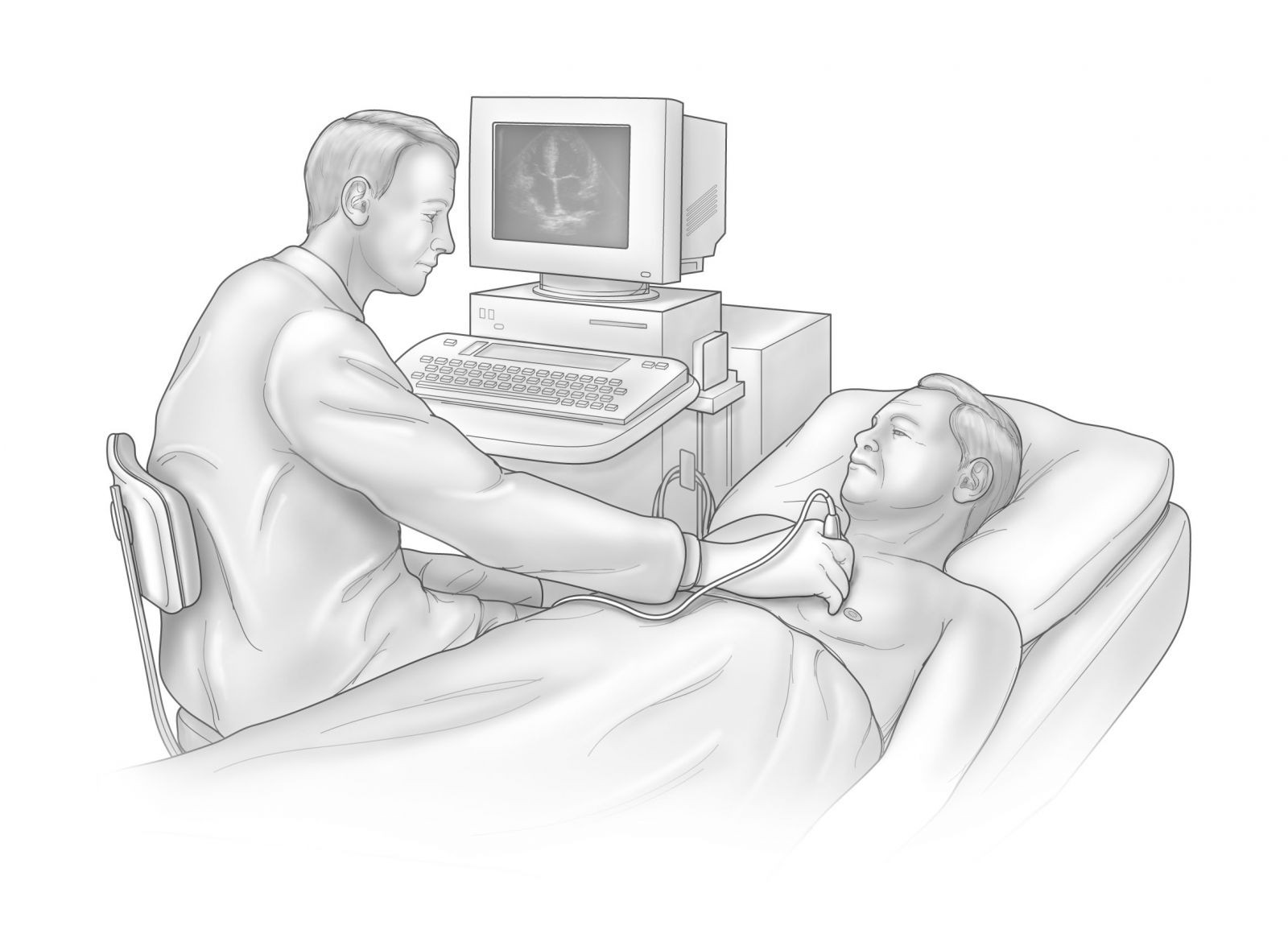
New thinking about plaque in arteries that feed the brain

Want to prevent shifting teeth? Maybe you need retainers

New evidence that polyphenol-rich foods help the heart

What you need to know about the new dietary guidelines

Food that’s healthier for people and planet can be cheaper, too

What are somatic workouts?

How to curb your stress eating

8 simple ways to reduce ultra-processed foods in your diet

How to spot Parkinson’s disease symptoms

Heart failure symptoms in women: How they’re different
Heart Failure Archive
Articles
What is a bubble study?
Ask the doctor
Q. My cardiologist mentioned that he was going to do a "bubble study" during my echocardiogram. What is that?
A. During an echocardiogram, a technician uses a probe that emits high-frequency sound waves (ultrasound) that "echo" off the structures of your heart. The waves, which are translated into video images visible on a monitor, can reveal in-formation about your heart's structure and function. A bubble study gives added information, as it can identify potential blood flow issues inside your heart.
A diet that may stave off heart failure
Research we're watching
A plant-focused diet long touted for its ability to lower blood pressure may also help prevent heart failure, according to a new study.
The DASH diet, which stands for Dietary Approaches to Stop Hypertension, emphasizes fruits, vegetables, whole grains, low-fat dairy products, poultry, fish, and nuts while minimizing salt, sugar, and red meat consumption.
Regular exercise helps reverse age-related changes in your heart
Moderate workouts on most days of the week may be enough for heart-healing benefits.
Image: © kali9/Getty Images
Good news: If you've spent most of your life as a competitive master athlete who trains more than six days a week (in addition to competitions) your heart probably looks and performs like one that is much younger than its chronological age.
Doesn't sound like you? Don't worry, there's also some good news for the rest of us. Even if you've spent more time hanging out than working out over the past few decades, starting an exercise program in middle age might earn you a younger-looking heart too.
Certain pain relievers could harm your heart
But use is primarily a concern for people who take them over a long period or who have certain health risks.
Image: © clu/Getty Images
Numerous studies in recent years have raised concerns that common pain relievers known as nonsteroidal anti-inflammatory drugs (NSAIDs) increase the risk of cardiovascular problems, such as heart attack and stroke.
A study published September 4 in The BMJ seems to confirm the risks associated with NSAIDs and notes that one medication in particular — diclofenac (Voltaren) — is associated with even higher risks to cardiovascular health than others in the same category.
Walking linked to lower heart failure risk in older women
Research we're watching
Image: © kali9/Getty Images
The more a middle-aged or older woman walks or does other exercise, the lower her risk of developing heart failure, a new study suggests. Heart failure — which means the heart is too weak or too stiff to pump enough blood through the body — affects some 5.7 million Americans.
Researchers tracked the exercise habits and heart health of more than 137,000 women who were ages 50 to 79 when the study began. After an average follow-up of 14 years, women who got at least some physical activity were 11% less likely to develop heart failure than those who didn't exercise at all — and those with the highest levels of physical activity were 35% less likely to develop heart failure.
Exercise: Better starting later than never
Research we're watching
Image: © adamkaz/Getty Images
Exercising regularly throughout life is the best way to keep your heart healthy. But starting to exercise even in late middle age may lessen the risk of heart failure, according to a report in the May 15 issue of Circulation. Heart failure, a gradual decline in the heart's ability to pump enough blood to meet the body's needs, affects about 6.5 million people in the United States.
The study involved more than 11,000 people who were part of a long-running project begun in the late 1980s, the Atherosclerosis Risk in Communities Study. Every six years, participants got medical testing and filled out questionnaires about their physical activity.
When the heart pumps normally but struggles
Ask the doctor
Illustration by Scott Leighton
Q. I was recently admitted to the hospital with heart failure and received a heart ultrasound. The test report stated that my heart's pumping ability is normal. I don't understand. Was my diagnosis wrong, or is the test wrong?
A. If you were diagnosed with heart failure in the hospital, I'm presuming that you were admitted with symptoms such as shortness of breath, fatigue, and difficulty doing everyday activities. Other common symptoms include swelling in your legs and feet and trouble breathing at night.
When You Visit Your Doctor - After a Heart Attack
After a Heart Attack
Questions to Discuss with Your Doctor:
- Have you had chest pain or pressure since you were discharged from the hospital?
- How severe is it?
- How long does it last?
- Does it stay in your chest or radiate to other parts of your body?
- Did you have this pain before your heart attack? What brings it on? How frequently do you get it?
- What were you doing just prior to the chest pain?
- Do you ever get chest pain or pressure at rest?
- What relieves the chest pain?
- If you take nitroglycerin, how many doses do you usually need to take before the pain goes away?
- How often do you take nitroglycerin?
- Do you get short of breath when you lie down or exert yourself?
- Do you awaken in the middle of the night short of breath?
- Do your ankles swell?
- Do you ever feel lightheaded?
- Have you fainted?
- Do you get rapid or pounding heartbeat for no reason?
- Do you know what each of the medications you are taking does?
- Do you know the side effects of each medication?
- Are you having any side effects?
- Are you taking an aspirin every day?
- Are you doing everything you can to modify the risk factors that can worsen your coronary artery disease (cigarette smoking, high blood pressure, high cholesterol, and diabetes are the most important risk factors)?
- Are you participating in a supervised exercise program?
- Are you resuming your normal activities?
- Are you sexually active?
- Have you returned to work?
- Have you been feeling depressed since your heart attack?
- Have you been able to reduce the stress in your life?
- Have you been fatigued?
Your Doctor Might Examine the Following Body Structures or Functions:
- Heart rate, blood pressure, and weight
- Pulses in your wrist, groin, and feet
- Listen over the major arteries in the neck, groin, and feet (for abnormal noises)
- Look at the veins in the neck to see if there is extra fluid in your body
- Heart and lungs
- Ankles and legs (for swelling)
Your Doctor Might Order the Following Lab Tests or Studies:
- Blood tests for glucose, lipid panel (cholesterol levels) and C-reactive protein (CRP)
- Electrocardiogram
- Echocardiogram
- Exercise stress test
Low potassium levels from diuretics
Thiazide diuretics like hydrochlorothiazide (Esidrix, HydroDIURIL, other brands) continue to be a very effective way to lower blood pressure for people with hypertension. They're inexpensive, and results from large studies have shown them to be at least as effective as other types of blood pressure drugs for most patients.
But if you're taking a diuretic, your potassium levels need to be watched. These drugs direct the kidneys to pump water and sodium into the urine. Unfortunately, potassium also slips through the open floodgates. A low potassium level can cause muscle weakness, cramping, or an abnormal heartbeat, which is especially dangerous for people with heart problems.
Ask the doctor: Checking for blocked arteries in heart failure?
When a person develops heart failure without a good explanation for the underlying cause, a heart catheterization to check for blockages in the coronary arteries may be appropriate.

New thinking about plaque in arteries that feed the brain

Want to prevent shifting teeth? Maybe you need retainers

New evidence that polyphenol-rich foods help the heart

What you need to know about the new dietary guidelines

Food that’s healthier for people and planet can be cheaper, too

What are somatic workouts?

How to curb your stress eating

8 simple ways to reduce ultra-processed foods in your diet

How to spot Parkinson’s disease symptoms

Heart failure symptoms in women: How they’re different
Free Healthbeat Signup
Get the latest in health news delivered to your inbox!
Sign Up










